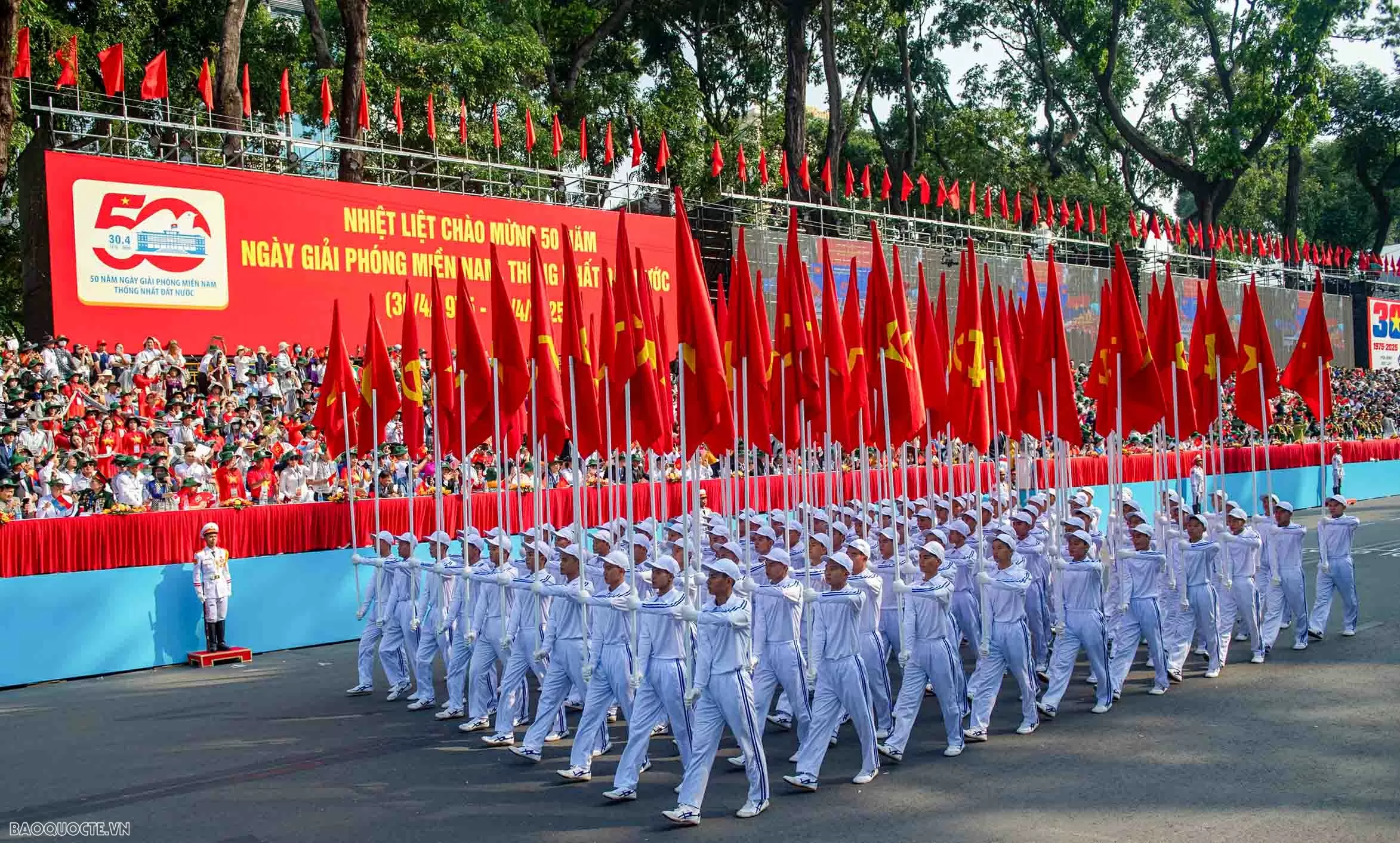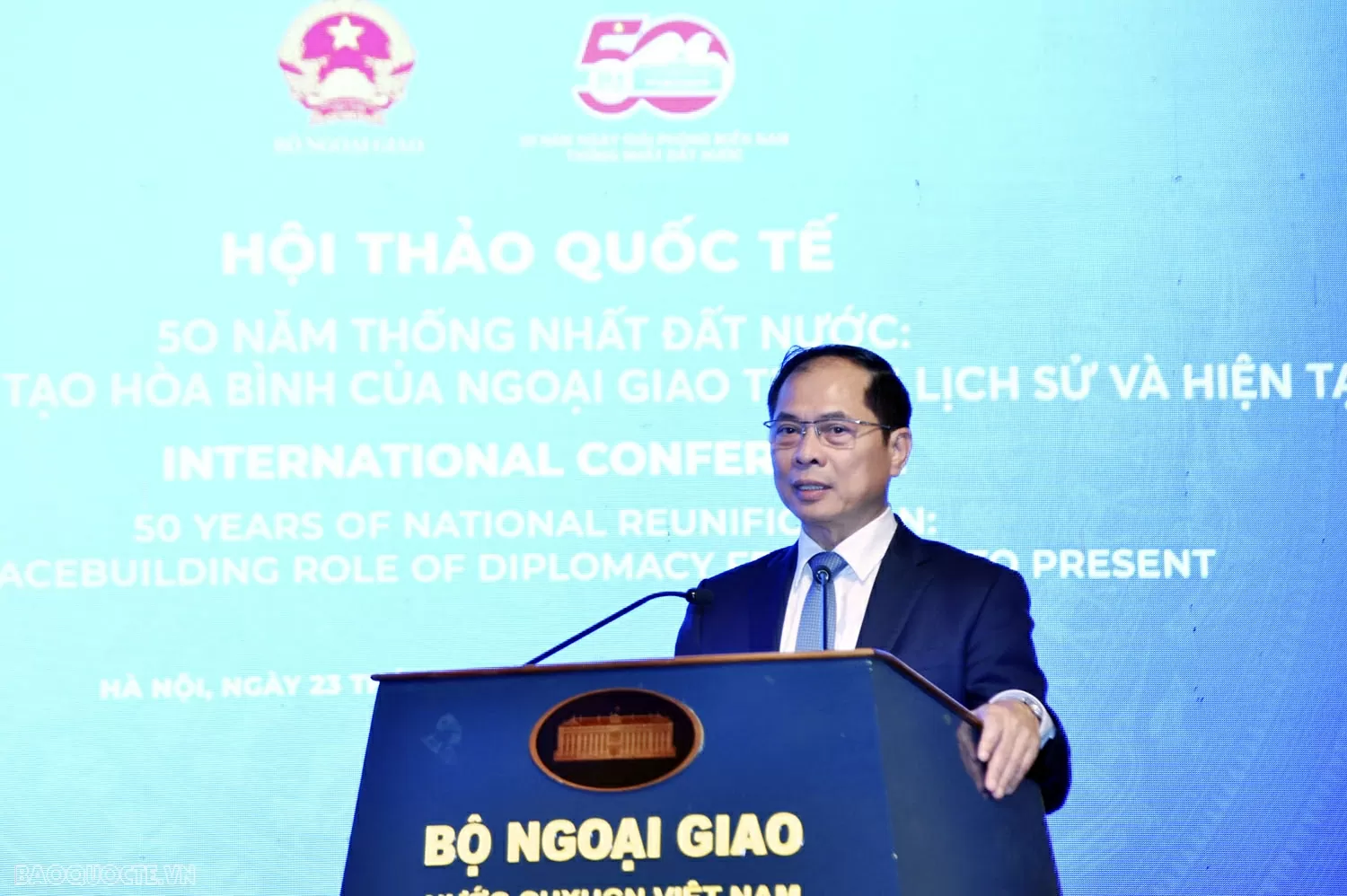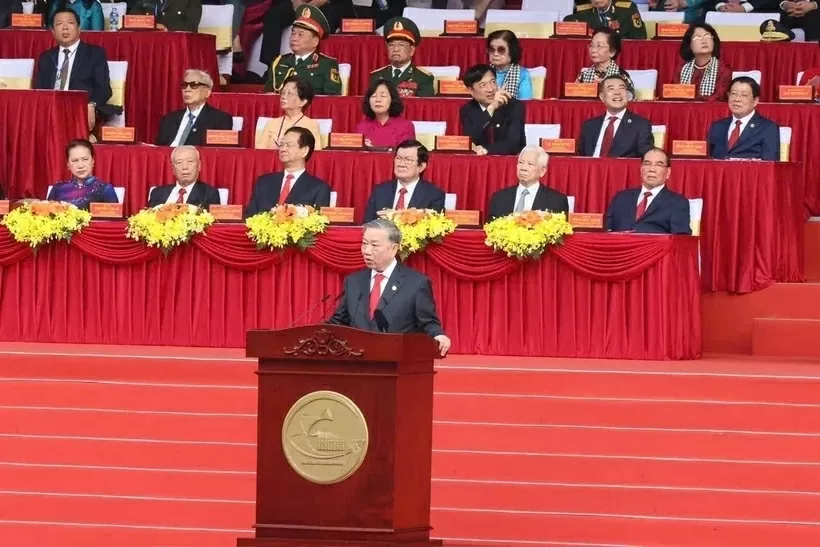
Vietnamese diplomacy's contribution to the Liberation of the South and National Reunification: Historical lessons that remain valuable today
Latest
 |
| Grand parade commemorates the 50th anniversary of the Liberation of the South and National Reunification in Ho Chi Minh City, on April 30, 2025. (Photo: Nguyen Hong) |
Fifty years ago, the Great Spring Victory of 1975 marked the end of a long and arduous resistance war, leading to the complete liberation of the South and the reunification of the country. This was a glorious chapter in the nation's grand history of building and defending the country. As recognized by the 4th National Congress of the Communist Party of Vietnam in 1976:
“The victory of the Vietnamese people in the cause of the liberation of the South and national reunification will forever be recorded in the history of our nation as one of its most brilliant pages - a shining symbol of the triumph of revolutionary heroism and human intellect, and it will go down in world history as one of the great feats of the 20th century.”
Vietnamese diplomacy is deeply honoured and proud to have played a role in that great national victory. Over the past 80 years, history has shown that the nation’s major triumphs on the battlefield have always gone hand-in-hand with victories at the negotiating table.
Just as the historic Dien Bien Phu victory laid the foundation for the achievements of the Geneva Conference, the success of the Paris Agreement on Ending the War and Restoring Peace in Vietnam (1973) played a crucial role in the historic Spring Victory of 1975. The diplomatic triumphs during this period have left behind invaluable lessons that remain fully relevant to this day.
Diplomacy - An important strategic front
Entering the resistance war against the United States, in carrying out President Ho Chi Minh’s sacred directive that “no matter how difficult and arduous the struggle may be, our people are determined to achieve total victory; our country will certainly be reunified; the people of the North and South will surely be reunited under one roof,” the foremost national interest at that time was the liberation of the South and the reunification of the country.
In the context of having to “fight the strong with the weak,” our Party identified the creation of a comprehensive strength drawn from both the national power and strength of the era as a decisive factor. This included the strength of great national unity from North to South; solidarity with Laos and Cambodia; support from socialist countries, especially the Soviet Union and China; and the backing of progressive forces around the world.
With that spirit, the 13th Central Committee Plenum in 1967 affirmed that “Diplomatic struggle does not merely reflect the battlefield struggle; given the international context and the nature of the war between us and the enemy, diplomacy plays an important, active, and proactive role.” Subsequently, in 1969, the Politburo issued a resolution recognizing that “Diplomacy had become a strategic front of significant importance.”
First, diplomacy was combined with military and political efforts to create a strategy of “fighting while negotiating,” mobilizing the comprehensive strength of the nation. In this synergy, military and political struggles served as the foundation for diplomatic negotiations; in turn, diplomatic efforts reinforced and amplified the successes of the military and political fronts. Through flexible and skillful strategies, once the right moment arrived, we compelled the United States to sit at the negotiating table in 1969, opening a new landscape of gradual victory. The intense battles of wits at the negotiating table with one of the world’s leading powers forged the courage and intellect of revolutionary Vietnamese diplomacy. Outstanding diplomats such as Le Duc Tho, Nguyen Duy Trinh, Xuan Thuy, Nguyen Thi Binh, Nguyen Co Thach, and generations of Vietnamese diplomats became symbols of steadfast will, firm resolve, sharp intellect, and diplomatic finesse.
The art of combining “fighting and negotiating” in diplomacy reached its peak with the signing of the Paris Peace Agreement. Alongside military victories such as Khe Sanh and the Tet Offensive, the achievements at the negotiating table forced the U.S. to de-escalate and ultimately sign the January 1973 agreement, completing the mission to “drive out the Americans” and paving the way for “toppling the puppet regime.”
Under the terms of the Paris Peace Agreement, the United States was compelled to withdraw all troops and weapons from South Vietnam, creating favorable conditions for revolutionary armed forces, political organizations, and mass movements to strengthen. As a result, the battlefield dynamics shifted in favor of the revolution, creating a decisive opportunity, which the Politburo in 1974 recognized as: “Beyond this moment, there will be no other opportunity” to completely liberate the South and reunify the country.
Second, diplomacy harnessed the strength of the three revolutionary currents, mobilizing the support of socialist countries and a broad international front backing the just struggle of the Vietnamese people.
The famous words of President Fidel Castro - “For Vietnam, the Cuban people are willing to shed even their own blood” - became a powerful slogan symbolizing the material and spiritual support provided by fraternal socialist nations.
Alongside the will and determination of our military and people, the comprehensive support and aid from socialist countries played a vital role in achieving glorious victories on the battlefield. Through his prestige and diplomatic efforts, President Ho Chi Minh, along with other pioneering leaders, not only rallied international support but also made significant contributions to strengthening the unity and cooperation among socialist nations.
The Vietnamese revolution became a rallying point for solidarity among socialist countries, even during moments of division and disagreement. At the same time, guided by the spirit of “helping others is helping ourselves” Vietnam built strong bonds of solidarity and combat alliance with Laos and Cambodia, contributing to the revolutionary victories in each of these countries.
In addition, Vietnam’s "hearts-and-minds diplomacy" won people over with its justice, reason, and moral integrity, creating a broad popular front in support of Vietnam.
The name “Vietnam” became a symbol of the global national liberation movement, drawing support not only from the peoples of developing nations but also from within the United States itself and from many prominent international politicians, scholars, and intellectuals.
Millions of people across the five continents - even within the heart of America - took to the streets to protest the war. The wave of solidarity included volunteer movements to fight in Vietnam, donate blood, raise funds, and more, went globally. Iconic acts of support, such as Swedish Prime Minister Olof Palme joining anti-war protests, or American peace activist Norman Morrison self-immolation in protest of the war, became enduring symbols of the global struggle for peace and justice.
Third, guided by the spirit of friendship and cooperation, diplomacy expanded Vietnam’s foreign relations and laid the groundwork for post-war reconciliation with former adversaries. Even in the midst of war, Vietnam consistently expressed its desire to build friendly and cooperative relations with all nations involved in the conflict, including the United States. Vietnam was ready to “roll out the red carpet” to facilitate America’s withdrawal. Acts of goodwill, such as the humane treatment and release of prisoners of war, and efforts to support the evacuation of foreign citizens, demonstrated Vietnam’s peaceful, humanitarian diplomatic approach - a spirit that contributed to the normalization of relations with former adversaries in the postwar period.
Alongside our just struggle, diplomacy upheld President Ho Chi Minh’s guiding principle of “making as few enemies and as many friends as possible,” contributing to the expansion of Vietnam’s external relations — not only with socialist countries and newly independent former colonies, but also with Western capitalist nations. Immediately after the success of the Paris Agreement, Vietnam established diplomatic relations with many developed Western countries such as Japan, the United Kingdom, France, Italy, Canada, Belgium, the Netherlands, and others, thereby expanding international recognition of the Democratic Republic of Vietnam.
Fourth, as President Ho Chi Minh once said, “to succeed, one must foresee everything,” the strategic research and forecasting conducted by Vietnamese diplomacy provided crucial support to the political and military fronts.
Diplomacy accurately assessed and analyzed global dynamics, the interests and policies of both allies and adversaries, thus helping the Party Central Committee make timely strategic decisions throughout various phases of the struggle. During the “fighting while negotiating” period, diplomacy - alongside military offensives - launched political and public opinion campaigns that pressured the U.S. into halting its bombing of North Vietnam, adjusting its strategic direction, and agreeing to sit down at the negotiating table.
 |
| Deputy Prime Minister and Minister of Foreign Affairs Bui Thanh Sơo delivers a speech at the international conference titled “50 Years of National Reunification: The peacebuilding role of diplomacy at past and present,” in Hanoi on April 23, 2025 . (Photo: Quang Hoa) |
The history of warfare has shown that a well-judged strategic forecast can be as powerful as an army corps. Diplomacy contributed to military victories by helping assess the opponent’s situation during major operations such as the 1968 Tet Offensive and the historic Ho Chi Minh Campaign. In particular, during the 1975 Spring Offensive, diplomatic analysis correctly identified the weaknesses of the Sai Gon regime and the direction of U.S. policy, forecasting accurately that the U.S. would not re-engage militarily - a key factor in the decision to move swiftly toward total national liberation.
Lessons for the era of Vietnam’s rise
Vietnam’s young diplomatic service was born and matured during nine years of resistance against the French and was further forged through twenty years of resistance against the United States. The historic victories at the negotiating tables in Geneva in 1954 and Paris in 1973 represent the distilled wisdom gained during some of the most challenging periods in the history of Vietnam’s revolution. Tested and tempered during times when national interests were under severe threat, these lessons remain profoundly relevant in today’s era of national development.
The transformative changes of our time demand revolutionary decisions. As General Secretary To Lam has stated: “In this new era - the era of Vietnam’s rise - Vietnamese diplomacy must reach new heights to fulfill its noble responsibilities, deserving its role as a pioneering force, an integral component of the Vietnamese revolution.”
Embodying that vision, Vietnam’s diplomacy will continue to carry forward the timeless lessons from the struggle for the liberation of the South and national reunification, stepping confidently into the era of the nation's rise.
First is the lesson of safeguarding national interests as the highest priority. Throughout the resistance wars, Vietnamese diplomacy always upheld President Ho Chi Minh’s directive at the Third National Diplomatic Conference in 1964 that diplomacy “must always serve the interests of the nation.” Today, national interests continue to serve as the guiding compass for all diplomatic actions and the fundamental basis for determining when to cooperate and when to engage in struggle.
In today’s deeply interconnected world, the protection of national interests must also be grounded in equality, cooperation, mutual benefit, and joint efforts for peace, national independence, democracy, and social progress - all based on the core principles of the United Nations Charter and international law.
Second is the lesson of combining internal and external strength - merging national power with the power of the times. In the past, Vietnam’s "hearts-and-minds diplomacy" successfully mobilized vast material and spiritual support from the progressive forces of humanity. In today’s revolutionary phase of development, “development-focused diplomacy” must mobilize favorable external conditions and resources, including global trends toward peace, cooperation, and development; the shared desire for a just and multipolar world; and emerging trends such as the green economy, digital economy, circular economy - and especially the breakthroughs brought by the scientific and technological revolution, including artificial intelligence, semiconductors, and more.
In this context, diplomacy now bears the pioneering responsibility of unlocking cooperation with leading nations and global corporations, channeling capital and knowledge from innovation hubs, and enhancing Vietnam’s role within global production and supply chains.
 |
| 50 years of national reunification: General Secretary of the Central Committee of the Communist Party of Vietnam To Lam delivers the address at the national celebration of the 50th anniversary of the Liberation of the South and National Reunification in Ho Chi Minh City on April 30, 2025. (Photo: VNA) |
Third is the lesson of positioning foreign affairs as a "crucial, regular, and pioneering" element in safeguarding national interests. During the war, our Party made a strategic decision to recognize diplomacy as a “frontline” alongside political and military struggle.
Today, in a rapidly changing world marked by increasing competitions and conflicts, the Party has reaffirmed that, alongside national defense and security, foreign affairs must play a crucial and constant role in protecting the country early and from afar - firmly safeguarding independence, sovereignty, and territorial integrity, while shaping a peaceful, stable, and favorable international environment, and leveraging external resources to support national development. In particular, diplomacy must be elevated to deepen the frameworks of relations with partners, creating new spaces for the country’s security and development.
Fourth is the lesson of integration - aligning the nation with the main current trends of the times. In the past, integration meant aligning the Vietnamese revolution with the three major revolutionary currents and the common cause of socialist countries. Today, it means deep, comprehensive, and full international integration - turning global engagement into a driving force for development.
In this regard, the successful implementation of Resolution 59/NQ-TW on international integration in the new situation, along with Resolution 18-NQ/TW on organizational restructuring, and Resolution 57-NQ/TW on scientific, technological, and digital development, forms the “strategic trio” of the Party for this new revolutionary stage. Most importantly, integration must become a national effort - a “conscious culture” embraced by every citizen, enterprise, and locality. These are the key actors, main driving forces, and ultimate beneficiaries of international integration.
Inheriting the tradition of preceding generations, today’s diplomacy has built a favourable and wide-reaching foreign affairs landscape to support the safeguarding and development of the nation.
Vietnam has established diplomatic relations with 194 countries, built strategic and comprehensive partnership frameworks with 34 nations, and become an active member of over 70 international organizations. We have moved beyond purely economic integration to deep and comprehensive international integration, increasingly playing a core and leading role in important strategic issues and mechanisms - advancing both our national interests and making responsible, practical contributions to solving global challenges.
In every great victory of the Vietnamese nation, diplomacy has played a vital role. During the era of national liberation, diplomacy became a key front, contributing to the historic Spring Victory of 1975. In the era of Doi Moi (Renovation), diplomacy spearheaded the effort to break through the blockade and embargo, leading Vietnam into international integration and ushering in a new phase of national development.
With ideologies ahead of their time, the lessons from the struggle to liberate the South and reunify the country remain deeply relevant and continue to illuminate the path of diplomacy as it enters a new era - one of national growth and prosperity.
Diplomacy will continue to strive to serve the country and the people, ensuring that national interests are upheld at the highest level in this evolving global context.

















